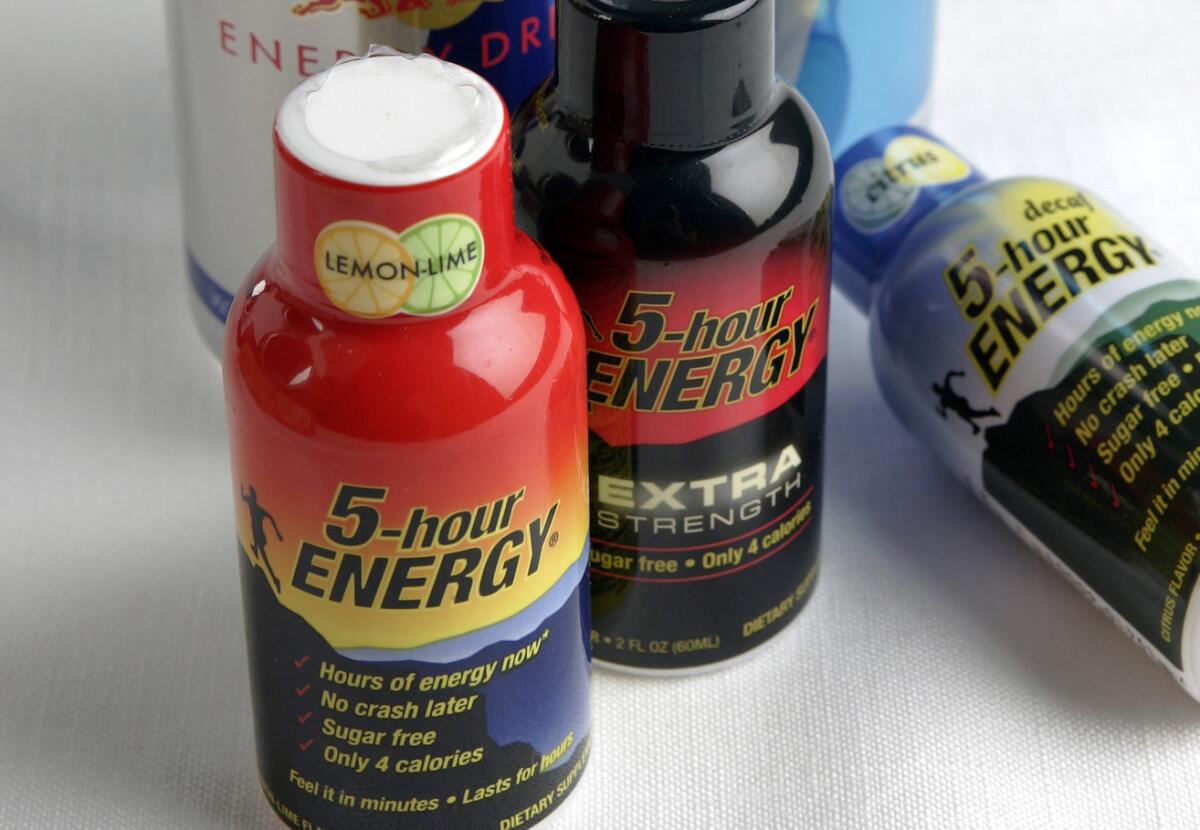8 accused of selling millions of counterfeit 5-Hour Energy drinks

Federal officials say 11 people conspired to manufacture and distribute counterfeit 5-Hour Energy drinks.
- Share via
Eight Southern California residents have been indicted on suspicion of selling millions of bottles of counterfeit 5-hour Energy drinks nationwide.
The eight are accused of diverting energy drink supplies intended to be sold in Mexico to the United States, where they could be sold for a higher price, according to the U.S. attorney’s office.
In all, 11 defendants were named in the federal indictment unsealed Thursday, accusing them of conspiring to traffic counterfeit goods, commit criminal copyright infringement and introduce misbranded food into interstate commerce.
“Criminals who produce and sell counterfeit and misbranded dietary supplements put the public health at risk by utilizing unknown and unregulated ingredients that could put the consumer in danger of serious illness or death,” Special Agent in Charge Lisa Malinowski of the U.S. Food and Drug Administration said in a statement.
Through their company, Baja Exporting LLC, defendants Joseph Shayota, 63, and his wife, Adriana Shayota, 44, both of El Cajon, agreed with Living Essentials, which owns 5-hour Energy drink trademarks, to distribute the caffeine boost in Mexico, according to the indictment.
Because the liquid dietary supplements were intended to be sold in Mexico, the packaging and labeling–created by Living Essentials--was in Spanish. Their attempt to sell the product in the United States failed because the packaging was in Spanish, the indictment said.
So the Shayotas’ replaced the labeling and display boxes with counterfeit labels that appeared to replicate Living Essentials’ packaging, according to the indictment.
More than 350,000 bottles of 5-hour Energy drinks were repackaged and sold across the United States for 15 cents below what Living Essentials charged for authentic bottles, the document said.
In December 2011, the Shayotas sold off what was left of their supply.
Then in 2012, the defendants began manufacturing the drinks at an “unsanitary facility using untrained day workers,” the U.S. attorney’s office said.
Drinks were made up of a mixture of unregulated ingredients. They hired manufacturers in Guadalajara, Mexico, to make plastic bottles and caps printed with Living Essentials’ logo.
More than 7 million counterfeit labels and hundreds of thousands of bogus display boxes were ordered from December 2011 to October 2012. Lot and expiration codes on the boxes also were altered, the document said.
Defendant Walid Jamil, who owned Michigan-based Midwest Wholesale Distributors, distributed more than 4 million counterfeit bottles to the U.S. commercial industry, according to the indictment.
He also sold to the Shayotas and defendants Kevin Attiq and Raid Attiq, who owned the Dan-Dee Company, according to the indictment. The Attiqs live in El Cajon.
Defendants Juan Romero, 68, of Upland, and Leslie Roman, 61, of Rancho Cucamonga, owned labeling companies and often used code words like “michelada,” “juice blend” and “spices” to refer to the counterfeit liquid contents, according to the U.S. attorney’s office.
Mario Ramirez, 55, and Camilo Ramirez, 30, both of San Diego, ran separate companies hired to print, design and package the products, according to the indictment.
For breaking news in California, follow @VeronicaRochaLA
More to Read
Sign up for Essential California
The most important California stories and recommendations in your inbox every morning.
You may occasionally receive promotional content from the Los Angeles Times.













